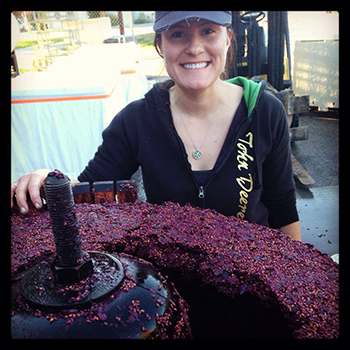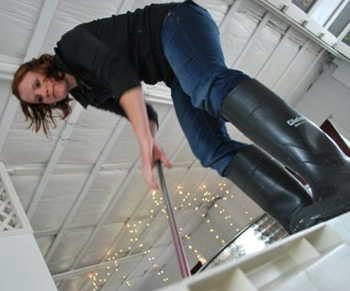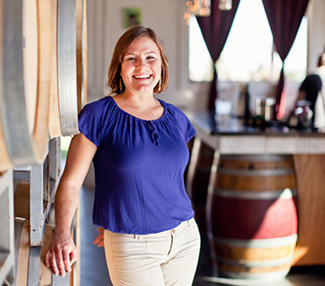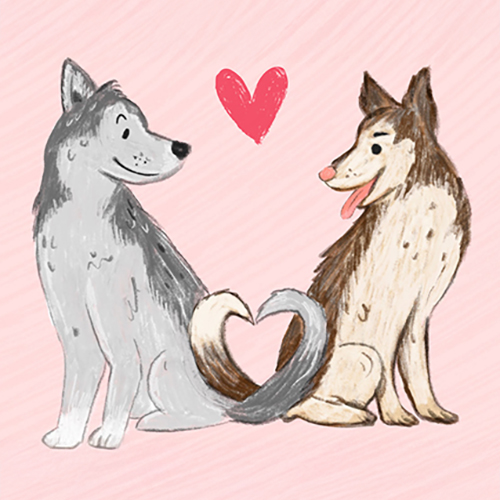Like many UW students, Angela Jacobs (BS, Biochemistry, Cell and Molecular Biology, 2003; MBA, 2010) discovered a passion for her future career while she was an undergraduate. But unlike most students, inspiration struck while she was waiting tables.
The restaurant was Italian, with an extensive wine list. The staff was tutored on the characteristics of each wine. “It was fascinating to me,” recalls Jacobs, who soon set her sights on becoming a winemaker. In 2010, Jacobs realized her dream, opening WineGirl Wines in Lake Chelan, Washington. The award-winning winery has since earned a dedicated following.

After setting her career goal, Jacobs shaped her UW education with that in mind. In addition to majors in biochemistry and cell & molecular biology, she minored in chemistry and botany and worked in the Botany Greenhouse, where she learned how plants react to different conditions. “There’s never a moment that I’m not recalling an experience from college that has been valuable in my life,” she says.
Jacobs studied abroad through a Germanics program in Austria, finding opportunities to visit wineries along the Danube. And in an Italian Studies course, she wrote “Wine Levels of Hell,” a paper inspired by Dante’s Divine Comedy. “I wish I still had that paper,” she says. “Unfortunately I never went and picked it up. That’s one of the saddest things. I would be intrigued to see what I came up with.”
After graduating, Jacobs took harvest jobs at wineries on the West Coast and in New Zealand to learn more about the business. She then worked on wine analysis at several laboratories, using skills she developed as an undergraduate. “A lab is a lab is a lab,” she says. “I learned all my lab skills at the UW.” She moved on to a pharmaceutical company, where she worked for three years while making wine in her free time.

Though Jacobs had a strong background in the science of producing wines, she was less confident about the business side of things. She returned to the UW for an MBA while continuing to produce wine. She “took the plunge” and opened her own winery in Lake Chelan in 2010, commuting to Seattle to complete the last six months of her MBA.
Jacobs chose Lake Chelan because of the climate and soil. “It’s got the most potential in the state to be a unique, world-class wine destination,” she explains. “The climate is significantly different than the majority of the wine-growing regions in the Columbia Valley. We have a longer growing season than, say, Walla Walla or the Yakima Valley. And I’ve been going there for vacations all my life, so it’s kind of an interesting coming together.”
There’s never a moment that I’m not recalling an experience from college that has been valuable in my life.
Despite her years working in the Botany Greenhouse, Jacobs does not grow her own grapes—yet. She is working on a business plan to buy acreage for a vineyard, but with developers buying up land for vacation properties, the prices are sobering. For now she works with vineyards that follow her specifications, including sugar and acid levels, time of harvest, cropping of vines, and other factors that impact the flavor of the fruit. “No other crops are grown based on their flavor profile,” Jacobs notes.
Once the grapes are harvested, “my responsibility is to not screw them up,” Jacob says, in a humble oversimplification of the winemaking process. Her company currently produces eight to ten varieties each year, including both reds and whites. She sells about one thousand cases under her WineGirl label, and produces another thousand for a private label.

Like a wise parent, Jacobs refuses to name a favorite wine. “It’s always been really difficult for me to pick a favorite,” she says. “I have a loving relationship with all of them. They are all little children, that’s for sure. And even once they are in the bottle, they evolve and can take on radical qualities over a year. They are alive the whole time. They breathe and the chemical structures oxidize and change. It’s kind of fascinating in that respect.”
Customers interested in buying Jacobs’ wines won’t find them on a grocery store shelf. They can be purchased through the WineGirl Wines website, or by calling Jacobs, or by visiting the winery, which is open daily in the summer and on weekends throughout the year. That personal connection with customers is fitting given Jacobs’ views on wine.
“Wine tells a story,” she explains on the company website. “It tells the story of the vineyard and the vineyard manager, the climate and the watering schedule. A wine then is passed into the hands of the winemaker at which point it tells the story of wine handling, manipulation, storage, aging, and filtration. All these components of the process are affected by the human touch that goes in to it. I am the first to admit that my wines are a direct reflection of my personal life and my decisions …Each wine is a story of my life.”
Visit the WineGirl Wines website to purchase wine, to learn more about the winery, or to contact Angela Jacobs.
More Stories

Finding Love at the UW
They met and fell in love as UW students. Here, 10 alumni couples share how they met, their favorite spots on campus, and what the UW still means to them.

AI in the Classroom? For Faculty, It's Complicated
Three College of Arts & Sciences professors discuss the impact of AI on their teaching and on student learning. The consensus? It’s complicated.

A Love of Classics and Ballroom
Michael Seguin studied Classics at the UW and now owns Baltimore's Mobtown Ballroom. The two interests, he says, are more connected than they might seem.